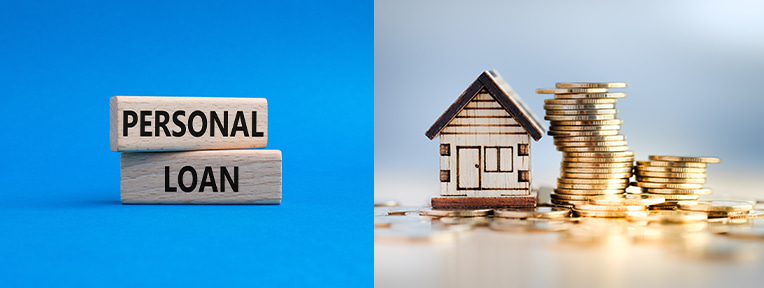
Personal Loan vs Home Loan
Posted on Thursday, October 24th, 2024 | By IndusInd Bank
Whether you’re planning to buy your dream home or need quick funds for a personal expense, choosing the right type of loan is crucial. Among the most common options available are personal loans and home loans—each serving different financial needs with unique advantages. But how do they differ, and which one should you go for?
In this blog, we break down everything you need to know about personal loans vs home loans, including their purposes, benefits, key differences, and frequently asked questions.
What is a Personal Loan?
A personal loan is an unsecured form of credit offered by banks and NBFCs (Non-Banking Financial Companies). You don’t need to provide any collateral to get a personal loan, and the application process is usually quick and hassle-free.
These loans are approved primarily based on your income, credit score, employment history, and repayment capacity.
What is Personal Loan Used For?
One of the biggest perks of a personal loan is flexibility. You can use it for nearly any purpose, including:
- Medical emergencies
- Wedding expenses
- Travel or vacation plans
- Higher education
- Home renovation
- Debt consolidation
- Gadget or appliance purchases
Since there are no restrictions on usage, a personal loan is often the go-to choice for managing unexpected expenses or lifestyle needs.
What is a Home Loan?
A home loan is a secured loan taken specifically to purchase or construct a residential property. Since it involves large sums and long repayment periods, the property you buy serves as collateral until the loan is fully paid off.
The lender holds a legal interest in the property during the loan tenure, and failure to repay can lead to repossession.
What is Home Loan Used For?
Home loans are designed for real estate-related purposes, such as:
- Purchasing a new or resale house/apartment
- Constructing a house on a plot of land
- Renovating or repairing an existing home
- Transferring your existing home loan to another lender for better interest rates
Because these loans are property-specific, their end use is fixed and documented.
Benefits of Personal Loan
- No Collateral Required: Ideal for borrowers without assets to pledge
- Fast Approval & Disbursal: Some loans are disbursed within 24–48 hours
- Flexible Usage: Use the funds as per your personal needs
- Shorter Tenure: Easier to plan and repay in 1–5 years
- Minimal Paperwork: Digital processes make it quick and convenient
Benefits of Home Loan
- Lower Interest Rates: Usually cheaper than personal loans
- Long Repayment Tenure: Can go up to 30 years, making EMIs more manageable
- Tax Benefits: Deduction under Section 80C for principal and Section 24(b) for interest payments
- High Loan Amounts: Suitable for big-ticket purchases like real estate
- Builds an Asset: You’re investing in a property that appreciates in value over time
Personal Loan Vs Home Loan: Key Differences
Let’s delve deeper into the key differences between home loans and personal loans. It will help you decide which one suits your needs best.
1. Purpose of the Loan: Flexibility vs. Specificity
The primary difference between a personal loan and a home loan is their intended purpose. Personal loans offer flexibility. You can use the funds for any personal reason like weddings, education, or debt consolidation. However, home loans are strictly for purchasing or constructing residential properties.
If you need funds for a specific, large purchase like a house, a home loan is the way to go. But if your needs are broad, a personal loan offers greater flexibility. If you are not buying a home but renovating it, IndusInd Bank’s Personal Loan for Home Renovation is the perfect option for you. You get the convenience of borrowing as much as you need and spending as per your wishes.
2. Loan Amount: How Much Can You Borrow?
The loan amount is another significant difference between these two types of loans. Usually, home loans offer larger loan amounts. Since a home loan is secured against the property, banks are more willing to lend larger sums.
Personal loans have lower borrowing limits as they are unsecured. For smaller, short-term needs, a personal loan might suffice.
3. Interest Rates: Cost of Borrowing
One of the most critical factors when choosing between a personal loan and a home loan is the interest rate. Usually, home loans come with lower interest rates. In contrast, personal loans have higher interest rates because they are unsecured.
4. Loan Tenure: Short-Term vs. Long-Term Commitment
The tenure, or repayment period, also varies between personal loans and home loans. Home loans usually have longer repayment periods. This extended tenure allows for lower monthly EMIs.
Personal loans have much shorter tenures. This means you will pay off the loan quicker. But it also results in higher monthly EMIs. You can use the Personal Loan EMI Calculator from IndusInd Bank to have a better idea.
To decide which loan suits your needs, consider how long you are comfortable being in debt. If you prefer a shorter commitment, a personal loan might be ideal.
5. Processing Time: Quick Access vs. Detailed Evaluation
The loan sanction process for a personal loan is usually quicker and simpler. Since personal loans do not require collateral, the approval process is faster. This is especially true if you are applying for an instant personal loan.
Home loans require more thorough checks, such as property valuation, legal verification, and income assessment. This makes the process longer.
6. Eligibility Criteria: Who Can Apply?
Eligibility criteria for personal loans and home loans are different. For home loans, banks assess factors like property value, your income, credit score, and employment stability.
Personal loan eligibility relies on your credit score, income, and employment history. Both loans require a good credit score. But personal loans are more accessible to individuals with varying financial backgrounds.
Also Read: Personal or Business Loan: Which One Will Best Suit Your Needs
Wrapping Up
Both personal loans and home loans serve important purposes—but they’re built for very different needs. If you’re looking for quick, flexible funds without any asset to pledge, a personal loan might be your best bet. On the other hand, if you’re ready to invest in real estate and need a large, long-term loan with tax benefits, a home loan is the way to go.
FAQ Related to Personal Loan Vs Home Loan
Which is better home loan or personal loan?
It depends on your needs. Choose a personal loan for smaller, urgent, or unplanned expenses. Opt for a home loan if you’re buying or constructing a house and need a larger loan with lower interest and longer tenure.
Can I take home loan and personal loan together?
Yes, if you meet the eligibility criteria for both. Lenders will assess your debt-to-income ratio before approving the second loan.
Is it good to take a personal loan and clear a home loan?
It depends. Personal loan interest rates are generally higher. You should only use a personal loan to repay a home loan if you’re consolidating debt temporarily or negotiating better terms later.
Can I convert my personal loan to a home loan?
Not directly. However, you can use a balance transfer or apply for a home loan separately, if the personal loan was initially used for home renovation or purchase.



 Offers
Offers Rates
Rates Debit Card Related
Debit Card Related Credit Card Related
Credit Card Related Manage Mandate(s)
Manage Mandate(s) Get Mini Statement
Get Mini Statement
 categories
categories Bloggers
Bloggers Blog collection
Blog collection Press Release
Press Release


